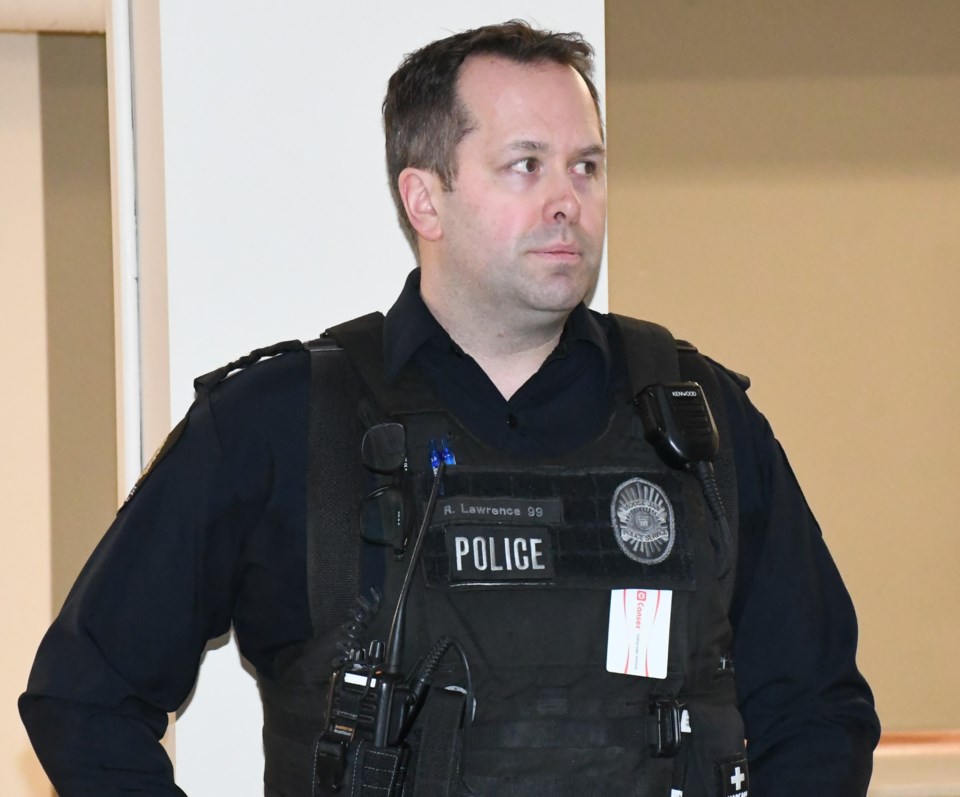MOOSEJAWTODAY.COM — The Moose Jaw Police Service (MJPS) plans to launch a pilot program in the coming months to support downtown businesses that continually face unwanted trespassers and require help in dealing with them.
The Moose Jaw Trespass Prevention Program (MJTPP) is a public safety initiative that allows officers to remove people who violate the Trespass to Property Act — provincial legislation that came into effect last year — from private commercial properties.
This removal can be done without business owners or property representatives calling the police or becoming directly involved after hours or when a property is vacant.
The program’s overall goal is to take proactive enforcement when dealing with trespassers and their behaviours, the MJPS said.
The police service presented the trespassing initiative to the Board of Police Commissioners during the latter’s Feb. 15 meeting. Sgt. Ryan Lawrence, the project lead, gave a comprehensive explanation of how the pilot program would work.
Launch date
The MJPS wants to launch the pilot program downtown soon — probably April — and expand it by the end of 2024, said Chief Rick Bourassa. However, if the program produces results immediately, then the agency could expand it everywhere quickly.
“I’m a big fan of pilots because you don’t lock yourself into something that might not be what you want, so it allows you to change without having a lot of disruptions,” he stated, adding the agency built this initiative using other police service’s programs.
Program overview
Officers will identify commercial properties and multi-residential buildings where trespassers — “loiterers and campers” — present a safety concern. For example, this could be in lobbies or ATMs.
There are “a few” downtown buildings with known problems, so police will contact those owners or tenants to see if they want to join, said Lawrence. Or, property owners can ask to be part of it by registering online; participation is free, although owners must sign an agreement.
After receiving the request, police will enter businesses into a database of properties that are part of the initiative, Lawrence continued. Property owners would be encouraged to contact the program co-ordinator if there is a change in ownership or management or if they want to cancel their participation.
Meanwhile, the co-ordinator will conduct annual check-ins with owners to ensure the police service’s records are updated and determine whether owners want to continue in the program.
Program ID
Once owners sign the form, an officer will visit the business and place a sticker in a visible location so people know about the establishment’s participation.
“This one is important from a patrol point of view … ,” said Lawrence.
Specifically, police could look at the entrance or exit, see the sticker, and know if the owner is participating. Officers could then act as the owner/agent and enforce the provincial trespass legislation. Moreover, they could move violators if they believe the people are disobeying the act.
Having the sticker visible should encourage trespassers not to cause trouble and to leave of their own will, Lawrence said. Also, patrolling officers won’t have to call headquarters to verify if the business is participating once they see the symbol.
The stickers will not have expiration dates, and instead, police will remove the symbol once an owner no longer wants to remain.
Educating trespassers
“This is not all about us just coming up and hauling people off the property. There’s going to be a conversation we’ll try to have to figure out why they’re there,” he continued.
Specifically, officers will educate trespassers about the provincial legislation while reminding them that they are on private property. Also, police will attempt to help trespassers, such as finding them shelter or contacting a Ministry of Social Services worker.
The final step will be a request to leave the property, with enforcement — tickets or arrests — a last resort.
“The law is the law. And police have been empowered to act on behalf of (owners). This (program) just kind of formalizes that,” said Bourassa. “And it informs us of what people’s wishes might be when they’re not there.”
Expenses
This program will not be available for residential properties, nor does it replace a service call during regular business hours, said Lawrence. If owners want someone removed, they must still call police headquarters and ask for officers to attend.
Also, even though owners may join the program, police will not monitor their property constantly.
The agency believes it can pursue this pilot project at minimal cost since the only major expense would be printing the stickers, he said, adding he plans to contact the downtown association and chamber of commerce to discuss the program.
Board comments
Board chair Crystal Froese appreciated learning about the program and thought it could mesh well with another initiative called Crime Prevention Through Environmental Design (CPTED), which says that proper design and effective use of built areas can reduce crime and improve quality of life.
Business owners could join the pilot program and have the police educate them about CPTED principles, she said, noting the library has also pursued CPTED to support and protect its staff.
“I don’t want to say (CPTED is) the best kept secret, but I don’t think it’s being utilized nearly as much as it could be … if people understood the benefits of it,” Froese added.
Police could have informal site visits with business owners to see how they run their operations and offer advice, which would be more manageable since CPTED courses are heavy, said Lawrence. Yet, the police service will review both practices with owners.
Bourassa added that the agency’s legal team and the provincial Crown prosecutor have reviewed the program and given it the thumbs up.




